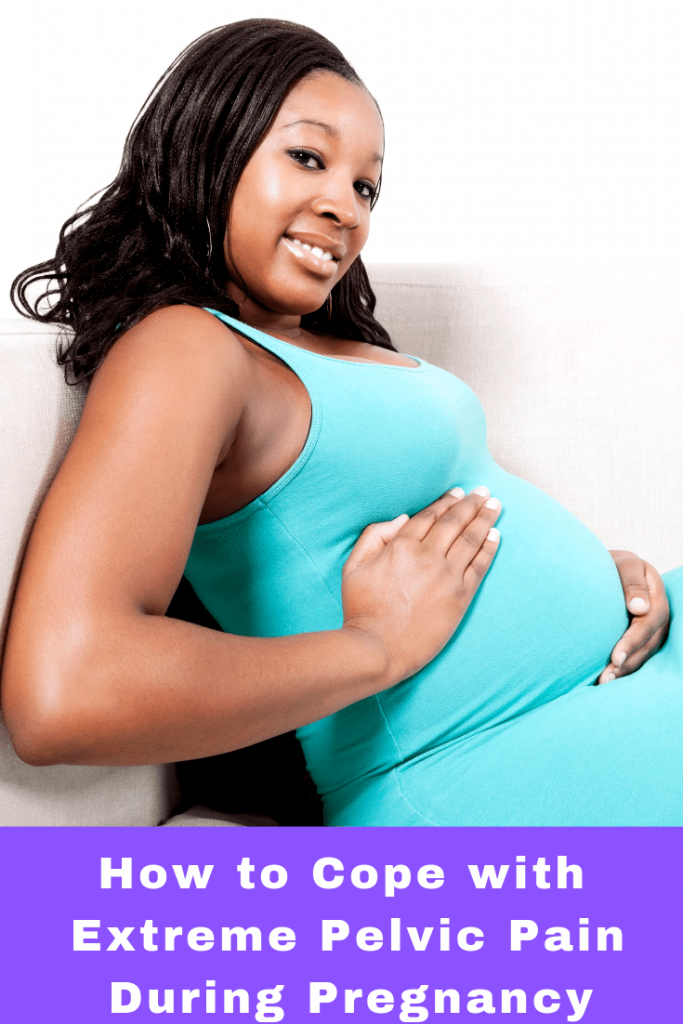Is extreme pelvic pain normal during pregnancy? As your uterus stretches to accommodate your growing baby, it is normal to feel occasional twinges, round ligament pain, and pressure in your pelvis. But it isn’t normal to feel extreme pain in your groin or low back.
Disclosure: This post is for informational purposes only and not to be used to diagnose your symptoms. Talk to your OB or midwife if you have any questions or concerns about SPD.
How to Cope with Extreme Pelvic Pain During Pregnancy
During your pregnancy, your body releases hormones that are responsible for relaxing the ligaments and muscles in your hips, pelvis, pelvic floor, and stomach. When your the ligaments and muscles in your pelvis loosen too much, it can cause the pubic symphysis to separate too early in pregnancy. Too much separation before delivery can cause your pelvic joint to become unstable and it results in strange sensations or extreme pelvic pain. This condition is called symphysis pubis dysfunction (SPD) or pelvic girdle pain (PGP).
If you notice extreme pain in your groin, you need to mention to your obstetrician at your next appointment or schedule an appointment sooner to discuss your options. During my third pregnancy, I experienced SPD and had no idea that it wasn’t normal. It was so painful to walk, climb stairs, get in and out of the car, or turn over in bed. I would have sought treatment so that I didn’t have to suffer during my third trimester.
Common Symptoms of SPD
Knowing the symptoms of SPD or PGP can help you determine if you need to see your health care provider. If you have any of these symptoms be sure to speak up and tell your doctor because as your pregnancy progresses your symptoms will be greater. Early treatment is best and can prevent complications.
- extreme groin pain
- it may feel as if your baby’s head is resting on your pubic bone
- swelling above your pubic bone
- clicking or popping noise in your groin
- low back pain
- may feel like your pelvis is going to split in half
- pain when rolling over in bed, putting on clothes, walking, climbing stairs, or balancing on one leg
- hip pain
- pain that runs down the inner thigh
- possible si joint pain

Causes of SPD
Like we mentioned above, relaxin is responsible for relaxing the tendons and muscles to support your growing baby and to prep for birth. However, the following factors can also contribute to SPD.
- weak muscles
- previous back problems
- obesity
- big baby
- pelvis injuries
- previous pregnancy with SPD
- hypermobile joints
- pelvic joints not working properly
- muscles in your lower belly and pelvis haven’t adapted to the changes caused by pregnancy
- waddling
Treatment for SPD
It is important that you mention extreme pelvic pain to your ob as soon as you notice it. Getting early treatment can help reduce the pain and have a healthy pregnancy. Often times SPD can affect your sleep and chronic pain can affect your mental health. Plus, being in extreme pain can cause your blood pressure to rise or cause additional stress on your baby. Your baby can sense when you are in pain.
Physical Therapy
Most OBs will urge pregnant moms to try conservative methods of treatment as the first line of defense and to avoid invasive procedures until after delivery. If you have SPD, your doctor will likely urge you to try physical therapy to help reduce your pain. Physical therapists can teach you exercises to help strengthen your muscles in your pelvis, low back, and hips to help support your growing baby. These exercises are safe for pregnant women and as your muscles get stronger the pain should begin to decrease.
Get an Adjustment from a Chiropractor Who Specializes in Treating Pregnant Women
Most chiropractors can help assist with extreme pelvic pain during pregnancy when an OB or health care provider dismisses the pain as a normal pregnancy ailment. A chiropractor can help realign your pelvis and the soft tissue that supports your growing belly. They also can recommend exercises to do between adjustments too.

Use a Pregnancy Belt
During my third pregnancy, I really wish that I used a pregnancy belt to help support my growing belly when I started having symptoms of SPD especially since I had ongoing chronic low back pain before I got pregnant. The pregnancy belt is designed to gently lift your belly off of your pelvis and support the muscles in your low back. As your baby bump grows, most of the pregnancy belts (affiliate link) are adjustable and can be used until you deliver your baby.
Ice
Sitting on an ice pack for 20 minutes several times a day can help relieve swelling and inflammation caused by SPD. Don’t be afraid to take an ice pack with you to work. It can help relieve swelling throughout the day and help reduce the pain.
Invest in a Maternity Pillow
Most doctors will advise you to put a pillow between your legs at night to help keep your pelvis aligned. One thing that I quickly noticed, when I used a regular pillow, it didn’t provide me with the proper amount of support. We suggest that you invest in a maternity pillow. (aff link) They are designed to add stability for your growing belly and you can also use part of the pillow between your legs. It also won’t be flat, unlike a regular pillow.
Slow Down
The extreme pelvic pain will likely slow you down. It is best to listen to your body and rest as much as possible before your baby comes.
Don’t be afraid to ask others for help and shop online as much as possible. Walmart grocery and Instacart can make grocery shopping easier, too bad they weren’t around when I had SPD.
Avoid Triggers
We know that it isn’t always possible to avoid triggers that aggravate you SPD symptoms. But being mindful throughout the day can help alleviate some of the pain. Try these techniques:
- sit down when changing clothes
- avoid sudden moves
- don’t cross your legs
- when sitting in a chair keep your feet together and pelvis aligned
- bring your knees together and slowly turn your entire body over or while getting in and out of the car
- use support if you need help getting after sitting for long periods of time
Ask Your Doctor for Medication
Medication should be a last resort when it comes to managing your SPD symptoms. There are medications that are safe to take during pregnancy. Chronic pain can cause your blood pressure to spike and put additional stress on you and the baby. There is no reason that you should suffer from extreme pelvic pain.
SPD is a painful condition that affects 1 out of every 300 patients and it is something that you shouldn’t ignore. Ignoring SPD pain can lead to complications including SPD that sticks around after you give birth and possible trauma to your bladder, clitoris, or urethra. Depending on the severity of your SPD symptoms, your ob or midwife may have to alter your birth plan.






I wasn’t officially diagnosed with SPD in my 2nd or 3rd pregnancy… But I’m pretty sure I had that. With both pregnancies, I did go to the chiropractor regularly. With my 2nd it wasn’t as bad – I was just not able to roll from laying on my side to laying on my back. That was mainly in the 3rd trimester. With my 3rd child, the pains started in my 2nd trimester – and I couldn’t even lay on my side. I went through therapy, chiropractor, pillow between the knees hurt more… But thankfully it was only when I would put weight laying on my side. 3 weeks Postpartum , and its mostly gone away.
Keep an eye on it. I’m still tender around my pubic bone. It doesn’t hurt to walk or turn over like it did when I was pregnant though.
I knew expecting mother experience pain as the baby grows; but I never knew exactly WHAT pains they were. This will VERY much come in handy when the time comes! Thanks so much for sharing this!
Pregnancy pains are the worst. There are so many different types, it’s crazy. I’m glad you shared this with us. I’m sure it’s going to be very helpful.
Great informative post! My daughter had a lot of pelvic pain during her pregnancy and Thank God her doctor helped her. It can be very painful and uncomfortable!
These were great tips for helping cope with the EPP, I remember using a lot of them myself!
I am so thankful I didn’t have to go through this during my pregnancies.
This is a great post because pain while pregnant can scare you senseless. You want be as informed as you can be about the possibilities so you can know when you should take things a step further or when you can simply rest.
I think pain is the worst thing especially during pregnancy. Your advice are so precious!
Thankfully, I never experienced extreme pelvic pain when I was pregnant. But my nephew’s wife is pregnant and probably suffering from it. Will share this with her.
Ouch, this wouldn’t be fun. It looks like you have some helpful tips here!